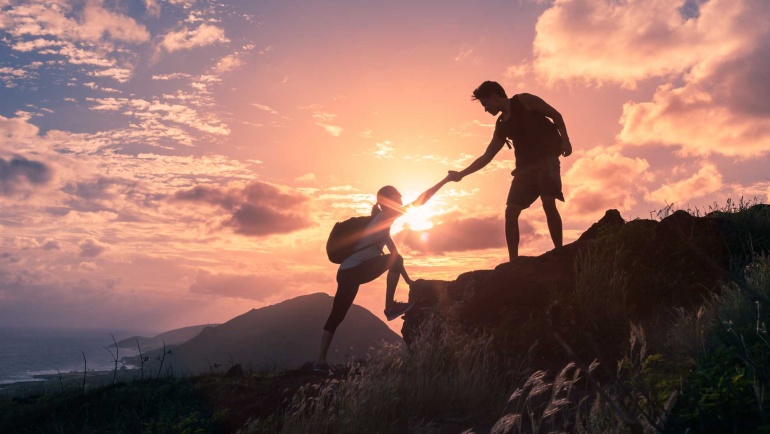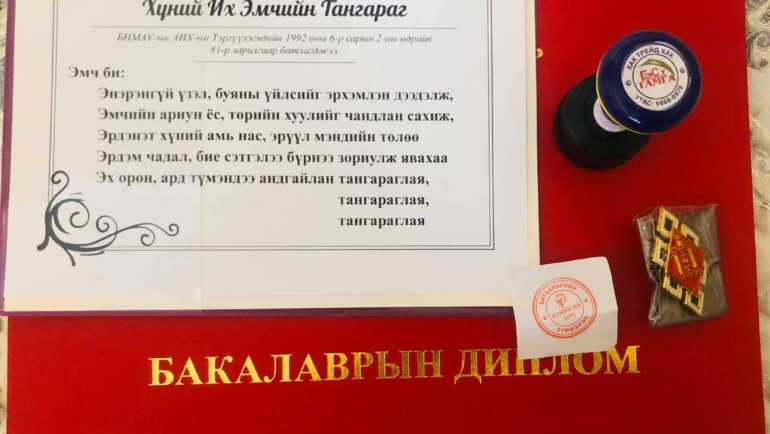Last year, I wrote a post about how we need to have a rubbish revolution in tourism. This was as a result of our annual two-day rubbish clean-up of Terkhiin Tsagaan Nuur National Park in Mongolia where we noticed an increase in discarded wet wipes, sanitary items and hygiene products.
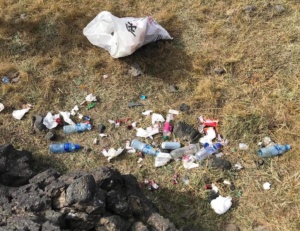
Our wilderness areas (and our wilderness experiences) are being spoilt by encountering soiled hygiene products left behind by others. Putting them under a rock, or shoving them down a tree root hole does not count as disposing of them responsibly. Proactive education seemed the way forward and thus we created our ‘Be A Changemaker’ Sustainable Tourism Strategy. This is a long-term project for us but here in a snapshot are some of our long term focus for 2020 and beyond.
- Water – because of Mongolia’s geographical location and climate, it faces a strain on its freshwater supply which the impact of tourism will only exacerbate. We’re looking at how we can limit our own impact on Mongolia’s future freshwater shortage – including looking at the accommodation we use, the way our team uses water as part of each trip and also how we provide drinking water to our guests.
- Women’s development – as a social travel enterprise, we look at the bigger picture rather than just focusing on achieving maximum profit. Our long-term support of Mongolian women remains ongoing with our free training & development programme.
- Accessibility – everybody needs the freedom of choice to travel and to enjoy experiencing a different culture and country. We are currently working on our accessibility guide and focusing on starting real conversations with potential guests that face accessibility issues.
- Impact of flying – we are conscious of the role flying plays in producing the carbon emissions that are part of the climate emergency and the situation is only getting worse. But I believe the answer is not as simple as paying for carbon emissions or stopping flying altogether. Jess is currently taking part in the Adventure Travel Trade Association Climate Action Leadership Studio – focusing on ways we can try to limit our impact and improve our operations.
- Local project support – the projects we support, often grassroots, provide greater opportunities and benefits for local communities within Mongolia. We want to continue strengthening these partnerships whilst making sure that they have a positive impact.
- Local education – including continuing our annual national park clean-up
- Community partnerships – we look to make sure we work responsibly within tourism and that our work benefits the local people and communities of Mongolia as much as it benefits our guests and us as a business. We focus on creating local community partnerships that offer long-term support to local people, families and Mongolian projects – encouraging their own sense of enterprise. We also look at ways we can continue to work with each family even when their personal circumstances change. We want to continue strengthening these partnerships whilst making sure that they have a positive impact.
You’ll see that plastics are missing from the list. They are part of the list but in 2020 we didn’t let a pandemic stop us and we still arranged our annual clean-up although we used a smaller rubbish truck as tourism to Terkhiin Tsagaan Nuur National Park (both domestic and international) had been limited due to Covid. However, there were still plenty (way too many) plastic bottles. Reducing our use of plastics was already part of our Sustainable Tourism Strategy but our 2020 clean-up has inspired our Mini Plastic Free Mongolia Challenge.
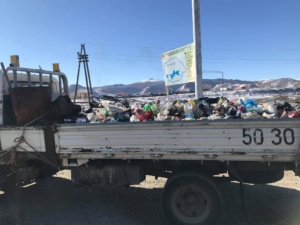
Worldwide we produce hundreds of millions of tons of plastic every year, most of which cannot be recycled. It’s like a toxic tide and it is obvious that we need to use less single-use plastic and move towards environmentally sustainable products. Yes, tourism needs to come together as an industry but individuals can also play a role. Where do we start such a challenge especially as we don’t want to become tokenistic? Well, we’re a small company and so with everything we do, we’ll start small and work our way up from there. That’s why we’ve created our Mini Plastic Free Challenge focusing on simple steps on what EL is doing to help our guests minimize their plastic footprint before coming to Mongolia. Here are the five steps of our Mini Plastic Free Challenge.




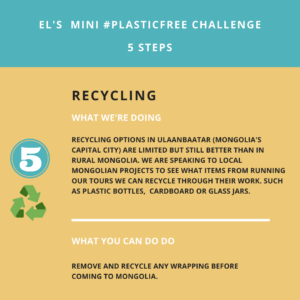
If all travellers focused on minimizing their plastic footprint and made the same steps then it could eventually make a world of difference. It’s not an easy task ad will be hard to eradicate fully but with small steps. However, as a tourism company, we are looking at the bigger picture as continuing use of disposable items puts additional pressure on the local collection and recycling within Mongolia. Our focus includes how we can remove or minimise our use of the following:
- Plastic bags
- Plastic film packaging
- Multi-pack rings for canned drinks
- Vegetable / fruit net bags
- PVC cling film
- Bottle tops/caps
- Single-use drinks bottles
- Fruit and veg punnets/trays
- Internal plastic trays e.g. trays used in packets of cookies or biscuits
- Disposable cutlery, plastic plates and bowls, plastic cups, lids and stirrers * we don’t use these on tour but do sometimes purchase in Ulaanbaatar
- Condiment or food sachets
- Tear off tamper-evident strips on containers
- Polystyrene packaging such as for takeaway food ordered from local restaurants
- Plastic straws * we don’t use these on tour but sometimes a drink in a local bar comes with a plastic straw
Where single-use plastic items or packaging cannot be avoided, we’ll give preference to recyclable/ compostable plastic and/or plastic packaging/items with recycled content. We’ll also look at reducing, sorting, and separating (plastic) waste.
We continue to believe that tourism can be a powerful force for good – that the travel and tourism industry will take responsibility to ensure that tourism focuses on its environmental impact as well as sustainable economic growth, full and productive employment and decent work for all. Now is the time for change. And we invite our guests to be a change-maker and join us in supporting our sustainable tourism strategy which includes our new Mini Plastic Free Mongolia Challenge.

